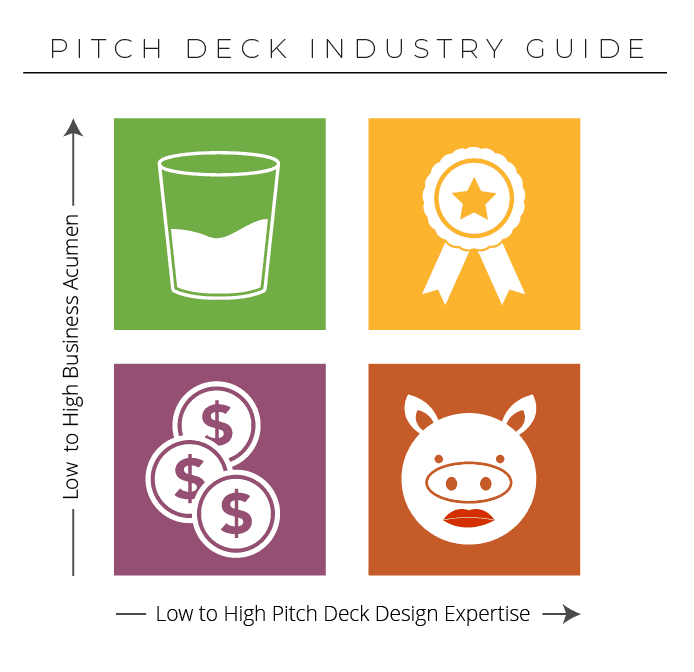If you’re seeking funding, you know by now that you’re going to need a pitch deck. And with so many other companies seeking funding from the same pool of investors, it’s especially important to get your pitch right. To stand out, many founders find themselves looking for outside help from pitch deck providers to create and design their pitch deck.
Last week I talked to a company in this very situation. They were planning to apply to Y Combinator and other high-profile accelerators, as well as seeking funds from several potential investors. They could see the value of a great deck, and clearly understood that their skills in storytelling, research, and design were limited. On their own, they were not going to get the outstanding results they were looking for. But they were dismayed by the lack of clear information in the industry. One of the founders told me, “We’re just struggling to figure out if we’re comparing apples to oranges, or apples to apples” with the pitch deck providers they were researching—Pitch Deck Fire included.
This confusion is totally understandable. Finding a great pitch deck design company can be a real challenge. It’s essential to find the right one for you and your company. Pitch deck providers (as well as other startup service providers) vary greatly in skill level, price point, and the services provided.
Thinking About Fit
Knowing you work with the best fit for your business when you’re pursuing investment and customer growth is important. This is an important time in your business, when key decisions can make or break your success. And at the same time you are more likely to be in an early stage, possibly bootstrapping, and tight on funds, so getting a very high value for the cost of any service is especially important.
There are many options: do it yourself, freelancers, business experts, or designers. How do you choose which one is right for you? The service level and output from each of these options vary wildly. We wrote an article recently that talks about these varied options and some pros, cons, and what to expect. You can check it out here.
Today, I’d like to focus exclusively on the pitch deck providers. These are companies that claim to specialize in pitch deck design. Even among this group, the services, scope of work, and end product can vary quite a bit, which makes that apples-to-apples comparison especially difficult. So for now I’m going to assume that you see the value in hiring an expert to support your pitch deck creation needs, and you’re looking at your options.
To fully analyze all the options, we spent time researching the highest-tier competitors in the industry, so that you don’t have to: Pitch Deck Industry Analysis.
Our analysis breaks the industry and its key players into four quadrants.


Investor Driven Design:
These providers know business and design. Leveraging a deep understanding of the investor mind-set, they produce pitch decks that tell a compelling story with custom messaging and world-class design. Their work can easily scale from investor audiences to customer-facing marketing and sales activities. A powerful combination that ensures you get funding and grow your company fast.
Lipstick on a pig:

Sure it looks great, but is it effective? These designers can give your pitch deck awesome visuals. But it’s like putting lipstick on a pig, and investors can see right through it. With limited business or investor knowledge, your pitch deck becomes a low-grade ‘fancy’ PowerPoint; poorly constructed with a muddled story and content holes that turn off investors. It’ll look nice though.
Glass half empty:

These firms are great at the business
Risky Business:

A low price can be appealing to the bootstrapped founder, but is it too good to be true? You only get one shot with investors, so you need to make it count. Leaving your business pitch to generalists who do not specialize in pitch decks, business or design, is a gamble. Quick and low cost decks are inexpensive. They often have to be re-done, making them more expensive in the long run. Not to mention missed opportunities with customers and investors in the meantime. Overall, this is the riskiest option.
The quadrants we’ve compiled are based on: (1) the degree of business specialization and knowledge, and (2) design capability. Softer skills (like storytelling and creating a custom message that engages and impresses the investor) are equally important, but are often covered by the intersection of the first two variables.
The reality is, the pitch deck is your first shot at developing and simplifying your message. Getting the story and visual elements right from the beginning will help you shift between customer and investor pitches more easily. It will also allow the early-stage founder group to hone their message and presentation with a good starter framework. Having this framework allows for more intentional learning and improvement to occur, as strengths and weaknesses are discussed with investors and customers.
Longevity is Key
What excites customers? Great outcomes and elimination of their pain. What excites investors? Customers in a lot of pain, and a strong customer commitment to your brand and solution. These are two sides of the same coin.
Choosing the right provider from the very beginning helps the founder group to focus. Focus is one of the most challenging things to develop at a startup, because of the very nature of the startup itself: everyone is multitasking and wearing multiple hats. How can you possibly focus?
Investment comes easier with great customer traction. Getting customer traction requires an intense amount of focus. Therefore, landing investors needs an equally intense amount of focus. We think you can leverage your pitch deck collateral in your customer marketing collateral. This combo should help you strengthen your pitch over time, through increased customer traction. Our goal at Pitch Deck Fire is to help our founders stay focused, close their funding rounds faster, and retain as much equity in their company as possible.
Through the pitch decks we create, we are unlocking the marketing and sales potential of the company through rich discovery, meaningful content and story creation, and scalable marketing collateral. This saves our customers time and money in the long run and gets them focused on creating revenue-based opportunities faster and more often.
Our pitch deck services were built on serving companies with a longer-term perspective who needed to close funding sooner rather than later, and also have a scalable design team they could use for additional marketing and design efforts.
Cost vs. Value (They’re Not the Same!)
But isn’t there a cheaper option? Yes. To be perfectly honest there is always a cheaper option. For toilet paper, shaving razors, logo design, and even pitch deck design. Someone out there will do it for $1, and someone else will charge $50k. It’s a spectrum; but it’s smarter to consider overall value, rather than cost. Because cheaper often has other, unforeseen (possibly massive) costs. After all, you’ll nick yourself more often with a cheap razor.
Unforeseen Costs of a Cheap Pitch Deck
- Longer fund raise – burn through more cash
- Fail to impress preferred investor – lose out on top-tier support
- Take your own time to create/manage collateral – Time spent away from other business-building & revenue-generating activities
If it takes you longer to get funding, your focus will be taken away from growth. If you can’t impress customers, you won’t impress investors. Poorly developed marketing plans and execution cost your business a lot, but this cost is often unseen. Considering the lifetime value of a customer to your business, it shouldn’t be that hard to see that even a top-tier provider like Pitch Deck Fire is actually a lower-cost option.
The amount of time spent managing your collateral development is another unseen cost. If you have a turn-key solution like Pitch Deck Fire’s, you don’t have to spend time wrangling designers and directing the creation process. After all, do you do 20 custom pitch decks per week? If not, you are probably better spending your limited time on something else. Focus on using your real strengths as much as you possibly can. Doing everything yourself is a great way to start, but it’s a terrible way to run a business in the long term. Finding people who can do it better than you is your main job as the owner and growth engine of your company.
But this is just the basics. If you’re trying to determine which pitch deck provider to move forward with, don’t choose before you review our industry analysis.







